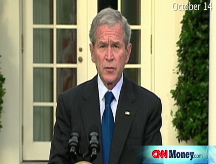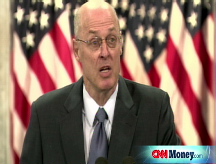Bailout: Don't forget the people
Former Fed vice chairman Alan Blinder said global governments deserve praise for latest steps to tackle credit crisis...but homeowners shouldn't be left behind.

 |
| Former Federal Reserve vice chairman Alan S. Blinder said that coordinated global efforts to stem the credit crisis were long overdue and that borrowers should not be left out of any future rescue plans. |
 |
| The Federal Reserve lowered its key short-term interest rate to 1.5% last week. |
NEW YORK (CNNMoney.com) -- The United States and the rest of the world are taking extraordinary steps to help keep banks afloat.
But a former vice chairman of the Federal Reserve, while applauding the most recent actions, still thinks more should be done to help the average consumer.
Alan S. Blinder was the Fed's No. 2 from 1994 through 1996 and was widely thought to be in the running for the top job one day. Now a professor of economics at Princeton University, Blinder said the Treasury Department's plan to invest directly in banks is a good sign.
"The institution-by-institution bailout strategy had to be abandoned. There always would be a slowest antelope in the herd to attack," he said Monday, before an official U.S. plan to invest directly in banks was unveiled on Tuesday.
Blinder said that, in hindsight, one of the biggest mistakes the government made was allowing Lehman Brothers (LEHMQ) to fail last month.
"It may not have been obvious then, but it's crystal clear that allowing Lehman to fail was a huge mistake," Blinder added. "That's what opened the floodgates to a whole host of problems. Within days of that, the antelope strategy ended. The Fed sort of saved AIG but Lehman was fed to the lions."
But even though Blinder is encouraged by the latest actions, he said he is concerned that not enough has been done yet to address the root of the financial crisis: the housing market.
"Don't forget about mortgages and refinancing them. When you trace this labyrinth of problems to their ultimate original route, it goes to the fear of massive defaults and foreclosures," he said.
"I'm starting to get worried that this will get lost in the shuffle," he added.
Blinder proposes a plan that is somewhat similar to what both presidential candidates have endorsed: buying up mortgages from banks and refinancing them.
But he thinks the emphasis needs to be placed on helping borrowers, not protecting lenders.
He said that the government should buy the mortgages below face value - similar to the strategy of the the Home Owners Loan Corporation (HOLC) that was set up during the Great Depression.
That makes it easier to work with borrowers in order to keep them in their homes.
"If you buy the mortgages at a loss, it would still not be as big of a loss to banks as there would be in foreclosure," he said.
One recent government action has been to lift the limit on FDIC deposit insurance to $250,000 from $100,000. The FDIC also announced Tuesday that it was removing caps on insurance for non-interest bearing accounts, which many small businesses rely on to park money in the short-term.
That was a good move, said Blinder, but cautions against getting rid of the limit altogether, as some have called for.
Disclaimer: Blinder is also affiliated with a firm called Promontory Interfinancial Network, which has a service for banks that helps offer customers increased deposit insurance.
Blinder argues that eliminating the limits is unnecessary since people aren't pulling money out of banks in droves.
In fact, he said that unlimited deposit insurance could cause people to pull money from other short-term investments, such as money-market funds and eventually even bonds and stocks, in favor of banks. That would have the undesired effect of contributing to more volatility in the global financial markets.
In addition, unlimited insurance would be costly.
"We need to be sure that we treat taxpayer money as scarce resource. We could guarantee against losses in any financial transaction but the natural reaction to that would be, 'Where are you going to get the money?' "
"The nation has a budget. It is elastic and we keep expanding it and shouldn't be stingy. But we have to fire heavy artillery fire at the problem rather than blindly in the air," he said.
Finally, Blinder talked about the fact that the Fed and other central banks around the globe may need to lower interest rates again to encourage more bank lending.
During his brief tenure at the Fed, Blinder earned a reputation as being among the more dovish of the Fed members - i.e. he was in favor of lower interest rates and less concerned about inflation.
With this in mind, he said he was "disheartened" that the coordinated rate cuts announced last week did not "give the markets a jolt."
Blinder said he could see a need for the Fed to bring its key overnight bank lending rate as low as 1% (it is currently at 1.5%), but that the Fed should try to avoid going any lower than that. What's more, he said the Fed should not keep rates at 1% for an extended period of time as it did during 2003 and 2004.
Some economic experts have maintained that because former Fed chairman Alan Greenspan kept rates so low for so long, that helped contribute to the subprime mortgage mess and housing bubble. Blinder said that this was "probably a valid criticism."
Blinder added that even though the credit markets are frozen, it would be a huge mistake to send the signal to companies and individuals that there is no cost or penalty associated with taking out a loan.
"The Fed would never be doing this if it was not an emergency," he said. "But you wouldn't want to go much lower than 1%. If you get literally to zero or virtually zero you create a problem that the Japanese encountered. Money is free and businesses that ought not be borrowing it are borrowing it." ![]()



